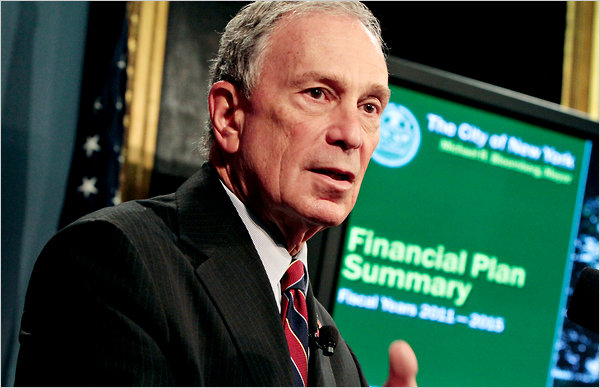Mayor Michael R. Bloomberg said Friday that he intended to eliminate 4,100 teaching jobs through layoffs, and about 2,000 through attrition, the first significant layoffs of teachers since the fiscal crisis of the 1970s.
Bloomberg to Lay Off Thousands of Teachers

Mayor Michael R. Bloomberg on Friday unveiled at City Hall what he called a "budget full of difficult decisions" that includes the loss of more than 6,000 teachers.
By DAVID W. CHEN and JAVIER C. HERNANDEZ
Published: May 5, 2011
The job cuts are part of Mr. Bloomberg’s effort to slice an additional $400 million from various city agencies. He needs to plug a multibillion-dollar deficit in his $65.6 billion spending plan for the fiscal year that begins July 1. That budget is about the same size as the current one.
Scott M. Stringer, the Manhattan borough president, criticized the mayor’s lack of transparency in releasing his budget. “This document is political,” he said. “This is not the way we should be running the city.”
The deep cuts to the city’s schools are similar to what the mayor proposed in February, though the number of layoffs is slightly less.
Mr. Bloomberg, during his budget presentation at City Hall, faulted the state for the necessity of layoffs among the 75,000 teachers. In 2008, he said, the state paid 45 percent of the city’s education costs; next fiscal year, he said, the state would pay 39 percent.
“I understand the frustration that parents and teachers feel; I feel it too,” he said. “We are not going to walk away from our education system.”
The mayor’s budget proposal must still be approved by the City Council; Speaker Christine C. Quinn and other members said they would do everything possible to prevent such major cuts to the work force.
Councilwoman Melissa Mark-Viverito said teacher layoffs were “unacceptable.”
“We continue to ask the least among us to bear the brunt,” she said. “I’m really concerned.”
Gov. Andrew M. Cuomo and Mr. Bloomberg have clashed over the city’s financial situation with Mr. Cuomo saying that the city has enough money to avoid massive layoffs.
But all of the news will not be bleak. The Bloomberg administration said that it would open 10 new senior centers, each serving 250 to 300 people. One of the centers will cater to the visually impaired, while another will be designed to serve gay, lesbian, bisexual and transgender older people.
Heeding calls from members of the Council and advocates for children from low-income families, the mayor retreated from his initial budget proposal to eliminate almost 16,000 child care slots.
The city said it would preserve 4,400 of the 16,000 slots for low-income children at day care centers that faced elimination. An additional 10,500 slots will be covered by the Department of Youth and Community Development’s Out-of-School Time program, which provides after-school recreational and academic programs. The total cost is about $40 million.
That leaves more than 1,000 slots facing elimination, though the Council may provide additional money as it finishes up the budget over the coming weeks.
“While it is a step in the right direction, it is unclear if what the administration has put on the table is really an appropriate solution to the significant reduction of funding to the child care system,” said Council Member Annabel Palma, chairwoman of the General Welfare Committee. “More conversations and details are needed since it is unclear how services can remain intact for all 16,500 children with $40 million instead of $91 million; it is also unclear what the impact will be on existing out-of-school programs, providers, child care centers and classrooms.”
The city has benefited from better-than-expected tax revenue, with money from banking taxes up as Wall Street has rebounded. Personal income taxes are also strong, about 9 percent higher so far this fiscal year compared with the previous year, according to the Independent Budget Office. In addition, sales tax revenue is up slightly.
Council members seemed universally upset by the budget — both the content and presentation.
Several dismissed the $40 million that the administration had touted in additional child care funding as a “shell game” because the net result was still a $50 million drop in funding compared to last year. They also said the administration was unwilling to consider any tax increases, such as a tax on the wealthy, and unwilling to tap more money out of a health care retirement fund.
“This is three-card monte,” said Councilman David Greenfield of Brooklyn, a Democrat who has often been a Bloomberg ally. “They leak a story about how they’ve restored money but they’ve done anything but restore child care. It’s fundamentally dishonest.”
He continued, “The unmistakable message for the administration to the City of New York is our children are not worth funding.”
Several took umbrage at the fact that unlike in most years, Mr. Bloomberg did not show up to give his usual short address to members before turning the presentation over to his budget director, Mark Page. They also described Mr. Page’s presentation as unusually brief — about 30 minutes versus the normal hour.
“His attitude was like, ‘gotta go,’ ” Councilwoman Letitia James of Brooklyn said. “It reflects the mayor’s disdain, his disrespect and his lack of coalition-building with the City Council.”
Ms. James added that there were a few unpleasant surprises in the briefing, including the news that a $1.2 million program for a sexual assault response team within the Health and Hospitals Corporation would be cut entirely.